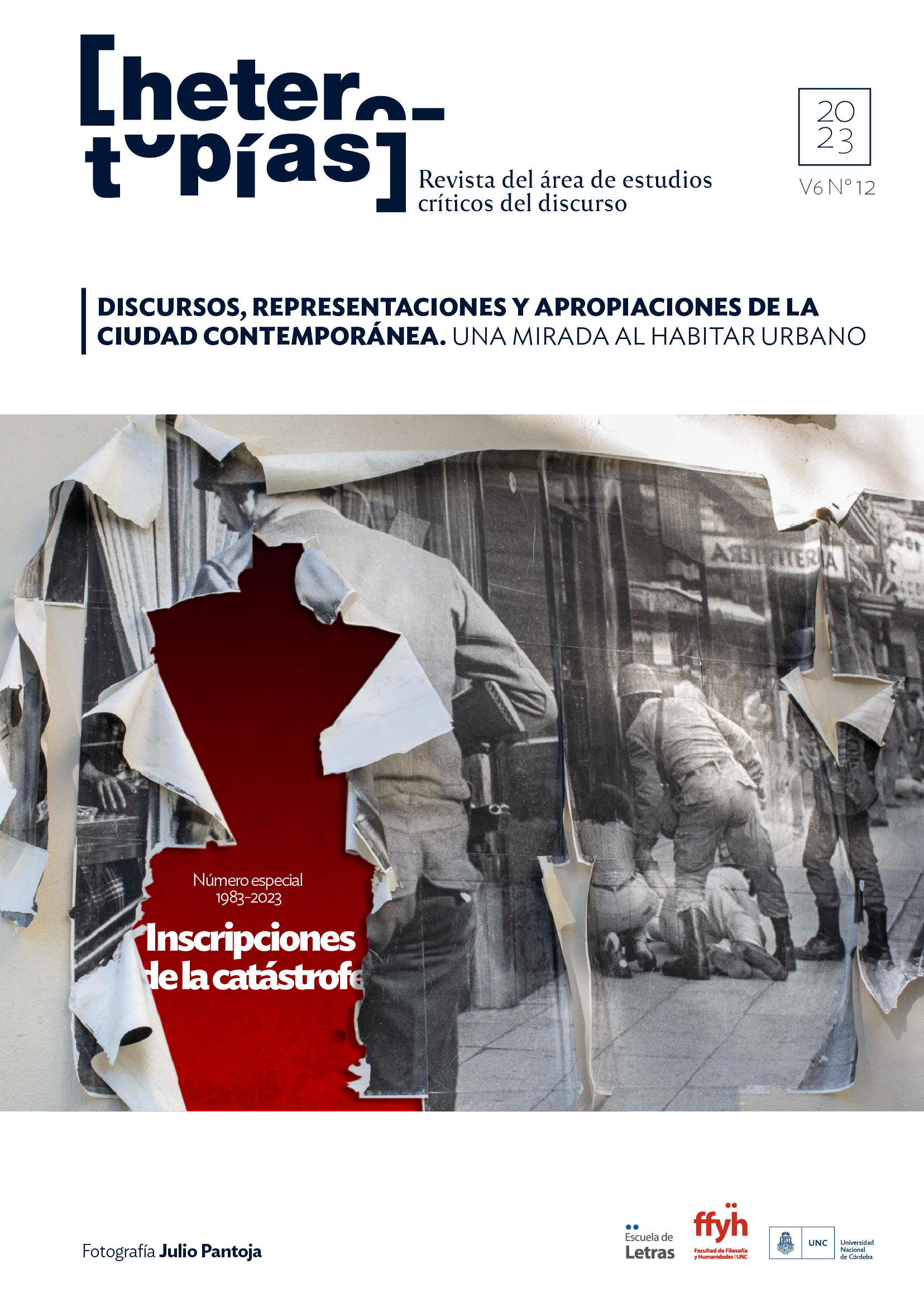"Don't let them take it from above." Melancholy as a Political Imperative
Main Article Content
Abstract
This article proposes to return to the so-called "Basterra Report", the statement that Víctor Melchor Basterra, survivor of the clandestine detention center of the Navy School of Mechanics (former ESMA) offered at the Center for Legal and Social Studies (CELS) in 1984 with the aim of thinking about the affective matrix that underlies his testimonial vocation. In this sense, a double dimension of analysis is proposed: on the one hand, to think about Basterra's archival vocation in his will to declassify documents of the repressors; on the other hand, to explore his compulsion to remember in terms of an operant melancholy that functions as a political imperative.
Downloads
Article Details

This work is licensed under a Creative Commons Attribution-NonCommercial-ShareAlike 4.0 International License.
Those authors who have publications with this journal, accept the following terms: Those authors who have publications with this journal, accept the following terms:
a. The authors will keep their copyright and guarantee to the journal the right of first publication of their work, which will be simultaneously subject to the Creative Commons Attribution - Non-Commercial - Share Alike (by-nc-sa) Attribution License; no commercial use of the original work or any derivative works is allowed, the distribution of which must be done with a license equal to the one that regulates the original work.
b. Authors may adopt other non-exclusive license agreements for the distribution of the published version of the work (e.g., deposit it in an institutional telematic archive or publish it in a monographic volume) provided that the initial publication in this journal is indicated.
c. Authors are allowed and recommended to disseminate their work through the Internet (e.g. in institutional telematic archives or on their website) before and during the submission process, which may lead to interesting exchanges and increase the number of citations of the published work. (See The effect of open access).
How to Cite
References
Ahmed, S. (2015). La política cultural de las emociones. México: UNAM.
Basterra, V. (2020). La quinta copia. Córdoba: Asunción.
Basterra, V. (2005). Sacar fotos. (M. Brodsky), Memoria en construcción. El debate sobre la ESMA. Buenos Aires: La Marca editora.
Brady, E. & Haapala, A. (2003). Melancholy as an Aesthetic Emotion, Contemporary Aesthetics, 1(1).
Brodsky, M. (2005). La camiseta. (M. Brodsky), Memoria en construcción. El debate sobre la ESMA. Buenos Aires: La Marca editora.
Didi-Huberman, G. (2010). Ante la imagen. Pregunta formulada a los fines de una historia del arte. Murcia: Ad Litteram/CENDEAC.
Didi-Huberman, G. (2012). Arde la imagen. México: Ediciones Ve S. A. de C. V.
Feld, C. (2014). ¿Hacer visible la desaparición?: las fotografías de detenidos-desaparecidos de la ESMA en el testimonio de Víctor Basterra. Clepsidra. Revista Interdisciplinaria de Estudios sobre Memoria, 1, 28-51.
Flatley, J. (2008). Affective Mapping. Melancholia and the Politics of Modernism. Cambridge, Massachusetts y Londres: Harvard University Press.
García, L. I. & Longoni, A. (2013). Imágenes invisibles. Acerca de las fotos de desaparecidos. (J. Blejmar, N. Fortuny, L. I. García), Instantáneas de la memoria. Fotografía y dictadura en Argentina y América Latina. Buenos Aires: Libraria.
Gómez-Moya, C. (2012). Derechos de mirada. Arte y visualidad en los archivos desclasificados. Santiago de Chile: Palinodia.
Gómez-Moya, C. (2018). Desclasificación de archivos secretos: política y policía en el devenir de los derechos humanos, Revista Heterotopías, 1(2), 1-25.
Pensky, M. (2001). Melancholy Dialectics. Walter Benjamin and the Play of Mourning. Massachusetts: University of Massachusetts Press.
Pollock, G. (2013). After-affects / After-images. Trauma and aesthetic transformation in the virtual feminist museum. Manchester y Nueva York: Manchester University Press.
Prati, R. (2018). De la melancolía a la depresión: reflexiones en torno a un desplazamiento Reflexiones marginales, 6.
Taccetta, N. (2019). Poéticas de archivo. Acerca del melancólico operante. (I. Depetris Chauvin, N. Taccetta) Afectos, historia y cultura visual. Una aproximación indisciplinada. Buenos Aires: Prometeo libros.
Tandeciarz, S. (10 de mayo de 2019). Los archivos desclasificados permiten reconstruir la trama de represión que la Junta Militar quiso borrar. Andar. Agencia de noticias. Recuperado de: https://www.andaragencia.org/los-archivos-desclasificados-permiten-reconstruir-la-trama-de-represion-que-la-junta-militar-quiso-borrar/
Zibell, R. (30 de julio de 1985). El testimonio de la semana: Víctor Melchor Basterra, El Diario del Juicio, 10. Buenos Aires: Editorial Perfil.
Fuente testimonial
CELS (1984). Testimonio sobre el Centro clandestino de detención de la Escuela de Mecánica de la Armada Argentina (ESMA). Buenos Aires: Centro de Estudios Legales y Sociales.
